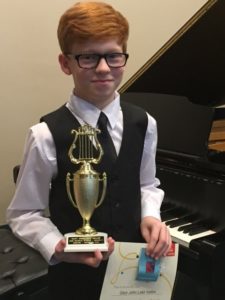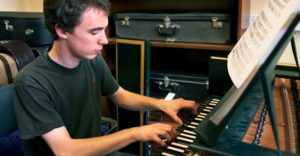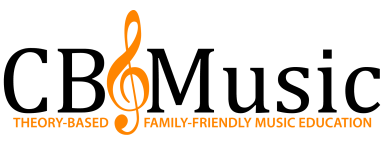 As a music teacher, one of my greatest goals is to bring my students through a journey in which they can pick up any music book, sheet music, or chord chart, and be able to play it on their own. My desire is for them to walk into musical situations with other musicians and navigate their part, from reading full notation with an orchestra, improvising with a band, and everything in between. I want students to unlock music in such a way that they can easily play, listen to, and create music with others.
As a music teacher, one of my greatest goals is to bring my students through a journey in which they can pick up any music book, sheet music, or chord chart, and be able to play it on their own. My desire is for them to walk into musical situations with other musicians and navigate their part, from reading full notation with an orchestra, improvising with a band, and everything in between. I want students to unlock music in such a way that they can easily play, listen to, and create music with others.
The secret is Music Theory.
WHAT IS MUSIC THEORY?
The dictionary defines music theory as “the study of the theoretical elements of music including sound and pitch, rhythm, melody, harmony, and notation.”
Honestly, that sounds sterile. How can we describe something that is beautiful, creative, evocative, and that gets right to the core of our beings, in such a sterile manner?
Easily.
Because music is a language. And everyone knows languages have mechanics. Spelling, punctuation, parts of speech…these language mechanics are comparable to the mechanics of music, such as rhythm, pitch, harmony, melody.
You see, music is not just a creative pursuit. It requires training the mind, the body (much like training for sports), the ear, and the eye. Music’s patterns are full of mathematical algorithms. Music’s sound is full of scientific elements that are measurable.
WHY WE NEED THEORY
Simply stated: music theory makes you better.
Let me explain.
If you have children, think back on how they learned (or how they are learning) to read. Did they simply memorize one book at a time and call it “reading”?
one book at a time and call it “reading”?
Or did they learn key elements like phonetics, high-frequency words, spelling, and punctuation? Isn’t the goal to teach children to decode words so they can read, understand, appreciate, and interact with the language they see on paper rather than just memorize words?
Of course! Because when we help our children unlock the written language, they can explore the beauty and creativity of any book—not just the ones we taught them to memorize.
Reading then naturally translates into writing. They can eventually express themselves through journals, poetry, short stories, and even jokes. We have opened a whole new world for them.
By comparison, teaching songs without the understanding of music theory is like teaching children to “read” by just having them memorize one book at a time. We have shown them a limited interaction with the language: a limitation to their understanding that greatly inhibits their potential.
Teaching students music theory gives them independence, freedom, and a deeper understanding of this medium. It makes their understanding so full, they can wield their instrument, much like the well-equipped writer who wields their pen masterfully. Music becomes a channel of self-expression.
That—in and of itself—is amazing. But it gets better.
 Scientific studies all over the world show that learning music theory is, in fact, the most beneficial aspect of music education, and it doesn’t just make better musicians. For example, studies show students who did no extra math and only learned music theory outperformed those who did extra math practice daily.
Scientific studies all over the world show that learning music theory is, in fact, the most beneficial aspect of music education, and it doesn’t just make better musicians. For example, studies show students who did no extra math and only learned music theory outperformed those who did extra math practice daily.
Music makes better writers, better scientists, better mathematicians. It affects every area of our brains!
It is the responsibility of music teachers everywhere to include music theory as a key element of learning music. Otherwise, what are we doing besides limiting students, and perhaps wasting time and money?
Get music in your kids’ lives. And make sure it comes with music theory!
~Betty Price
Program Director
CB Music

